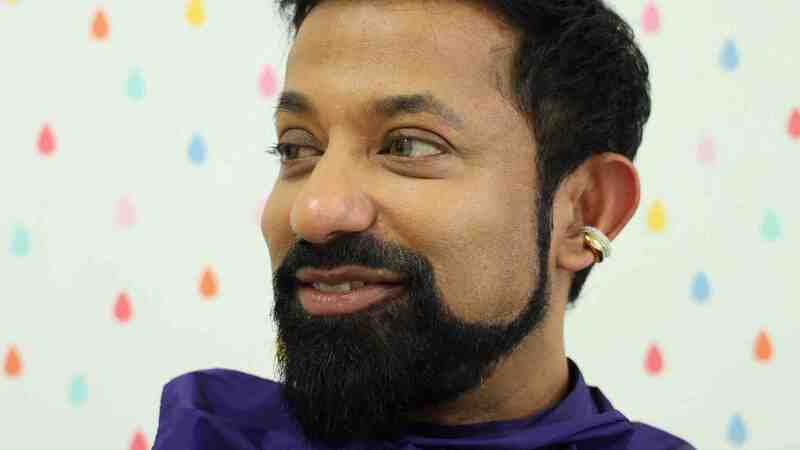You are viewing your 1 free article this month. Login to read more articles.
A bloody beginning
Two hundred corpses litter the first page of Mark Lawrence’s début Prince of Thorns. Two hundred corpses, posing “as corpses do”, as the town square runs red, “blood in the gutters, blood on the flagstones, blood in the fountain”.
It’s a dark tale Lawrence is telling, but then it began in a very dark place: his wife Riven Vincent who has been in the papers, over her much-covered cry of despair that, without more help from the authorities, the couple would be forced to place their severely disabled daughter Celyn into care.
“My daughter was born about the same time I started writing [Prince of Thorns], and [she was] in a very bad way, so I guess there was some unfocused anger there that materialised on the page,” says Lawrence, speaking from his home in Bristol. “I wrote a lot of the early stuff in hospital with my daughter, in the middle of the night. I didn’t have a laptop so I was just scratching away with a pen.”
A scientist working in artificial intelligence, Lawrence never really expected that the story – which is dedicated “to Celyn, the best parts were never broken” – would find the light of day. “Every time I felt the itch I would find some time after midnight and scratch it,” he says. “I’m not overburdened with free time. I tend to write late at night in short bursts . . . It was never my plan to get published, it didn’t seem like a very realistic prospect.”
But he found an agent, Ian Drury, who was quick to warn him that “the publishing world moved with glacial slowness. Six weeks later, he phoned me up and said I had a deal. He said: ‘Are you sitting down?’ I was, with my daughter on my lap, I was reading her a story. I put her over my shoulder and carried her into the kitchen. She’s prone to having fairly life-threatening seizures, so when my wife saw my face she thought that something terrible had happened.”
Partly inspired by A Clockwork Orange, Prince of Thorns is the story of Prince Honorous Jorg Ancrath. Unscrupulous and unprincipled, razor-sharp and compelling, this 13-year-old heir to the throne rides his broken empire and “loots its corpse”, hiding from his stony father, and from his memories of his mother being raped and then, together with his little brother, murdered in front of him. Jorg, who has plans to be king by the time he’s 15, is no simplistic, do-as-you-were-done-by sort of character, though, and while his world might be dark, it is by no means black and white.
“You can write dark characters in a very shallow way and have very little impact. They can do terrible things but you don’t care about them or what they’re doing, it’s not going to affect you. Jorg was my attempt to write a character you could believe in as a real person,” says Lawrence. “If you draw a parallel with A Clockwork Orange, there you have a main character who is fairly psychopathic but came from a perfectly reasonable background, and then ends up playing on the idea he might have had a terrible background, whereas Jorg really did have a terrible background but denies it has any responsibility for what he does.”
This desire for realism in his fantasy is echoed by the scientist’s decision to set his début—the first in a trilogy—on a post-apocalyptic Earth. “I enjoy fantasy, I like the idea of swords and sorcery, I like the medieval stuff, but always felt a bit uneasy as to why. Why’s it like this, where are we, what’s going on? So I just liked the idea of having this connection with the real world in some way,” says Lawrence. “George R R Martin has done such a stunning job of creating an alternate history that you can buy into it, [but] it’s very easy to do [fantasy] in a fairly generic, boring way.”
The mention of Martin is apposite: the American fantasy giant is the writer who tempted Lawrence back into fantasy. A fan in his teens, he’d drifted away from the genre until 2000, when he picked up A Game of Thrones. “I was pretty much blown away,” he recalls. “It brought me back into fantasy. I started reading, thought he’d raised the bar, and started looking around for other books.”
Lawrence says there are no plans, as yet, to give up the day job. “I enjoy the science, and frankly the amount of money they are able to pay you, if that’s all you do for the next 20 years it’s not enough to keep you going,” he says. “I’m a realist. I didn’t expect to be published in the first place, and despite all the nice things people are saying, I’m not staking anything on things going on in the same vein. We’ll have to see what people think of it. If publishers knew exactly what the public liked . . .”
Mark Lawrence's The Prince of Thorns is out now, published by HarperVoyager.














